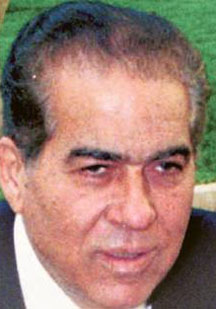CAIRO, (Reuters) – Protesters demanding an end to army rule in Egypt sought last night to build on momentum from a mass protest, bedding down in Cairo’s Tahrir Square for a ninth day just two days before the first free parliamentary polls in living memory.
Thousands stayed in the square late into the night yesterday, aiming to keep up pressure on the Supreme Council of the Armed Forces to further speed up a transition to democracy which they believe requires the generals to leave power now.
The political turmoil and violence – 41 people were killed this week – are compounding the economic woes of a country where livelihoods have been battered by a year of turmoil that started with the toppling of Hosni Mubarak in February by mass protests.
The generals have shown no sign of giving way to the demande to quit now. Instead, they have responded by promising that a new president would be elected by mid-2012, sooner than previously announced, and appointing a new prime minister to head a “national salvation government”.
Kamal Ganzouri, the new prime minister, held the same post under Mubarak. Speaking to the media on Friday, he described his task as thankless and “extremely difficult” and listed his priorities as securing the streets and reviving the economy. Egypt’s pound has weakened to its lowest level in seven years.
The Tahrir protesters have dismissed Ganzouri, 78, as yet another face from the past whose appointment reflects the generals’ resistance to change.
“Why are they picking Ganzouri now? This shows that the army is unwilling to let go of any power by recycling a former ally. This government won’t have any powers, why else pick someone that is loyal to them,” said protester Mohamed El Meligy, 20.
Divide
Tahrir Square and the surrounding streets were relatively calm on Friday after the deployment of extra security forces in areas where youths had clashed with police earlier this week.
The violence had fuelled public anger at the military council and drawn more protesters to Tahrir Square.
If maintained, the calm will deflate the arguments of those who argue that the first phase of the three-stage parliamentary vote should be postponed because of this week’s turmoil.
In a further boost to the military council, several thousand protesters demonstrated in support of the generals’ role in another Cairo square on Friday — a further echo from the last days of Mubarak’s rule when loyalists took to the streets.
Though smaller than the “Last Chance Friday” protest in Tahrir Square, the demonstration highlighted the division between revolutionary youths wanting to overhaul the whole system and more cautious Egyptians keen to restore normality.
The appointment of Ganzouri, who was prime minister from 1996 to 1999, has also drawn attention to the division.

“I favour him. He is a very good man, he did a lot of good things. If he had continued in his role (in 1999) the situation would have stayed much better,” said restaurant worker Osama Amara, 22.
The military council announced yesterday that each round of voting would be held over two days instead of one to give everyone the chance to cast their vote.
In Tahrir, where the main political groups such as the Muslim Brotherhood’s Freedom and Justice Party have avoided demonstrating this week, some protesters said the vote should still be delayed.
The Brotherhood, Egypt’s best organised political force, wants the election to go ahead as scheduled.
“Believe me, I don’t know who I am going to vote for,” said Hoda Ragab, a 55-year-old woman at Friday’s protest in Tahrir.
“In all sincerity, it’s because I don’t have any programme for any party in these conditions. It would be better for the elections to be delayed a week or two, so we can get over these problems,” she said.



